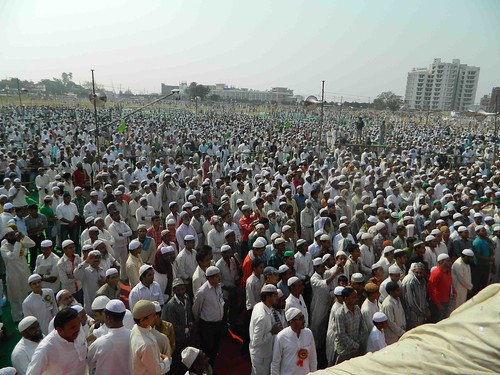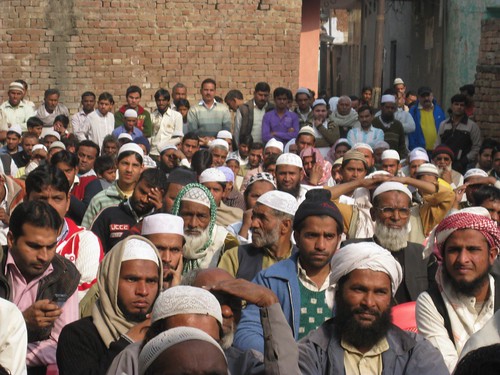By Aziz A. Mubaraki,
The Congress party in Uttar Pradesh is clearly in shambles. It has been in the miserable shape in the state mostly because of its internal feuds, and not because of any external political aggression. Congress has lost its popularity also because its leaders moved away from the masses over the past decades and has turned into a party of drawing room politicians. A party which once dominated the political scenario of Uttar Pradesh has been left with just a few legislative members in the state assembly today. The leaders indulged into unnecessary groupism and virulent campaign against each other. The Congress high command should act in a war footing to do away with the differences among the party leaders as it’s time for the leaders to put their heads together and to find out ways to regain their popularity they had lost some decades ago.
Muslims constitute about 14 percent of India’s population, making them the biggest minority group whose vote remains critical in key swing states like Kerala in South India, West Bengal and Assam in East and Uttar Pradesh in the North. And in Uttar Pradesh, which is the most populous state in India, Muslims constitute almost 20 percent of the voting electorate and as the community is famous to vote en-bloc, more or less as a monolithic group for one political party, their votes could prove decisive in at least 40 constituencies where they constitute 40 to 45 percent of the electorate, and could tilt the balance in favor of a party.

A section of the audience at the Muslim Maha Panchayat held in Moradabad on 16th October 2011
Before 1990, Muslims voted for the Congress, which was seen to be secular as opposed to the pro-Hindu BJP, but the gradual decline of its vote share and popularity among the minorities (namely, Muslims) has been a key factor behind the erosion of Congress’ platform. But post Babri Masjid Demolition, things changed statistically and Muslims preferred regional parties and Mulayam Singh Yadav’s tough posture against Hindu fundamentalism and his image as a “secular” leader saw the SP emerge as the party that protected Muslim interests. Consequently, the Muslim vote got divided between the SP and the Congress, with the former getting the lion’s share.
In Uttar Pradesh Muslims sorely lack political leadership and are coveted as vote bank by every political party barring the BJP. But then all political outfits make electoral promises like guaranteeing them protection and religious freedom, which the community now finds it offensive as they desire to look beyond social alienation and religious causes. Instead, they want guarantees on socioeconomic development, education and jobs. It’s pathetic that even after 64 years since independence Muslims still need to ask for equality! No government has worked seriously for the rights of Muslims. So, by and large, whichever party promises working for the upliftment, development and reservation will be voted by them. Muslims have faced systematic discrimination in the society, government offices and businesses. The Sachar Committee findings supported what Muslims have been complaining about discrimination for decades. But even years after the committee submitted its report to the government, the Congress-led central government has not bothered to address the miseries Muslims have been living through. Some half-hearted efforts were indeed made to improve the lots of the state’s mostly backward Muslims by successive state government and then by the Congress-led UPA government in the past few years too. But as Uttar Pradesh’s Muslims continue to be denied their rightful share in country’s development by the country’s largest political party, they decided to turn away from Congress.
India’s Muslims have always behaved in secular ways and have made efforts to stay with the mainstream, and have supported secular political parties dominated by non-Muslims. And have always accepted the leaders of secular parties as their leaders at the cost of raising leaders from within the community, for which Muslims do not happen to find Muslim leaders at national level. All charges by some groups portraying Muslims as communal or narrow-minded are absurd. Muslims have been marginalized in the society simply because they face discrimination in all walks of life. If the most powerful section of the society and the government treated the Muslims in unbiased manner, the community might have been able to come out of their ghettoes long ago.
Since 1992, no major communal unrest has taken place in U.P., yet Muslims’ socioeconomic condition in the state has not seen any improvement. Despite using the key Muslim support the Samajwadi Party (SP) & Bahujan Samaj Party (BSP) have stayed on in power for record stretch of years, but none of the above has helped uplift the rearward community. Some time back, for a while Muslims thought that Mayawati’s party would offer a viable alternative to the rest. But now they are disenchanted with this party as well, as it appears to be paying more attention at nothing except grabbing power and minting money as quickly as possible. Many Muslims who turned to Bahujan Samaj Party (BSP) in last few years have begun backtracking in recent months and they believe that this party too has not served the community well. Irrespective of all above Yadav’s appeasement of the BJP in recent years has raised questions over its secular credentials and fueled suspicions that the SP and the BJP might have struck some sort of a deal. The BSP and BJP might have fallen out, but that does not prevent the two patching up and holding hands in the event of a hung parliament. Both Yadav and Mayawati nurse ambitions of becoming the prime minister and they will sink to any level, including extending support to the BJP, a party they have bitterly reviled in the past.
The four main parties in Uttar Pradesh – the BJP, the Congress, the SP and the BSP – but some have suggested that the battle is a three-cornered one in most constituencies, with the Congress of some relevance only in a few dozen constituencies. And unlike previous elections, caste and communal considerations rather than development and the state of the economy will be the main issues that determine how the Muslims votes. As The BJP’s previous calls for construction of a Hindu temple on what was a mosque site at Ayodhya, which is part of the Faizabad constituency in Uttar Pradesh, do not strike a chord with Hindu voters anymore. Therefore BJP cannot expect to sail to power on the temple issue itself, the mandir-masjid (temple-mosque) issue, and more importantly, the potential this issue has to trigger violence, is very much on the minds of Uttar Pradesh’s Muslim community. This and the anti-Muslim pogrom in Gujarat in 2002 will be critical factors that will influence the Muslim vote.
The Muslims are now seething in anger and are preparing to teach all such parties a lesson in next year’s assembly elections. Taking advantage of the situation the Congress is targeting to come to power in the state. And with the emergence of Rahul Gandhi in the electoral fray has somewhat revived interest in the Congress party but whether this interest will translate into votes and improve the Congress’ electoral fortunes in this politically crucial state remains to be seen. For the past 20 years, the Congress has been in the wilderness in Uttar Pradesh. The party’s organizational machinery, badly battered by over a decade out of power, is said to be non-existent in large swathes of this state. Uttar Pradesh might have produced the most prime ministers and many aspiring prime ministers, but it is among the poorest states in this country. It ranks low on almost every socio-economic indicator and has witnessed the most number of communal riots and caste clashes in the county.

A scene of the Muslim reservation conference organised by Imam Council in UP
However, the community has begun thinking if Congress could offer a secular and progressive government which could make sincere efforts to reach out to them. And if Congress sets up a well-organized network extending to Muslims living in ghettoes – in villages, town and cities — it will reap a good benefit in all terms. The situation provides a very good opportunity and if its leaders make sincere effort to organize them well and reach out to Muslims, the community might not disappoint them. If it can win the Muslim heart in Uttar Pradesh with proper alliances, the community has the ability to propel the Congress to power in the state and this support will also in part help Congress consolidate its position in central power, for many years.
But then Rahul Gandhi must prove that he is a serious contender by revamping the sorry condition of Congress’s organizational machinery in the state, else the fear is that a vote for the Congress would end up being “wasted vote”.
(Aziz A. Mubaraki is Member, Advisory Committee, Airport Authority of India (NSC), Ministry of Civil Aviations, Government of India)

